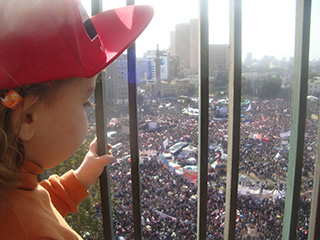Homemade Stories
حكايا بيتية- SYRIA, EGYPT / 2021 / Arabic / Color / DCP / 69 min
 Director: Nidal Al Dibs
Director: Nidal Al Dibs
Photography: Mahmoud Lotfy
Editing: Micheal Youssef Shafik
Sound Design: Max Schneider
Producer: Mostafa Youssef
Source, World Sales: Seen Films seenfilms.com
2011, when it finally seemed a wave of change might be coming to Syria. Having fled to Cairo, the director and his family are unable to return to Damascus as they had hoped. Smartphone video shows the state of their vacant house, bringing back memories and also conveying updates of the destruction of civil life by siege and bombing. Reconstructing from memory a film project that he had started shooting—about his formative cinematic experiences in his hometown of Homs and a ciné-club that was once part of his life, and not wanting to extinguish that light, the director enters an abandoned Cairo movie theater. Film is life. Finding a lifeline in recording his daughter’s growth, the director begins to spin a narrative out of the stories of filmmakers scattered everywhere. (WM)
[Director’s Statement] In dangerous times, not only our shared spaces are abandoned, but our private spaces too. Filming, I kept remembering my old Damascus home, following its news as a refuge for friends from demolished houses. A home, a homeland, is locked away awaiting another curious intruder to open it and fill it with life. First walking into this abandoned cinema, I imagined screening this film at Cinema Wahby’s grand opening on the third anniversary of Egypt’s revolution.
People in the neighborhood had a relationship to it. We began filming, renovation started, and many wanted to share their stories of the past and dreams for the neighborhood’s revitalized and bustling future. My presence with a camera was felt and welcomed. But the renovation faltered and we sensed hostility. Not directly towards us, but from loss of hope.
We captured moments where people we’d often filmed suddenly forgot us, similar to having forgotten their dreams becoming reality. They lost interest in the cinema since it was slowly taken away from them, with security and economic worries replacing their interest. Their disappointment and hardship was captured. And we too live in this country, feeling the same despair, as well as a loss of our hopes and dreams of revolution.
However this is not a film about politics, ideology, or revolution. As the country underwent the loss of dreaming about revolution, so did the same feeling envelop the smallest of projects in the most negligible of communities. We are true to the film: today I look in hindsight and analyze how we were then and wonder whether I too was audacious to dream.
 Nidal Al Dibs
Nidal Al DibsBorn in Syria in 1960. An architect and director, he graduated from the Gerasimov Institute of Cinematography in 1995. Many of his films have received international acclaim. The short Ya Leil Ya Ein (1999), was selected to screen in competition at Clermont-Ferrand, his feature Under the Ceiling (2005) screened at the Montreal World Film Festival and won the Jury Prize at the International Women’s Film Festival of Salé (Morocco) as well as the Best Actress prize at the Oran International Arabic Film Festival (Algeria), and the documentary Black Stone (2006) received Special Mention at the Ismailia International Film Festival For Documentaries & Shorts (Egypt) and was selected to show at the 2013 Locarno International Film Festival. His previous film, Taming (2010), had its premiere at the Abu Dhabi Film Festival.
